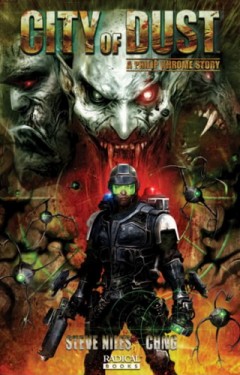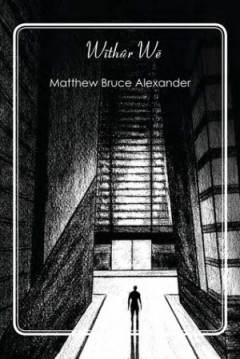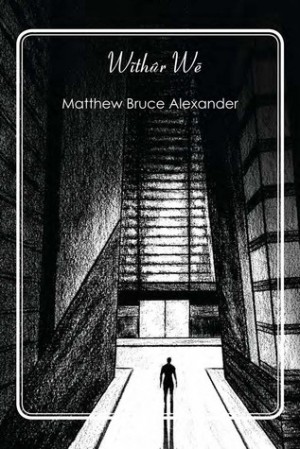
Brilliant art coupled with a clever story make Steve Niles’s graphic novel City of Dust an instant sci-fi horror classic. Niles, who also wrote graphic novel 30 Days of Night and the first draft of its film adaptation, loops good cops, bad laws, prostitutes, and mechanical nightmares into a deeper story about imagination and thought crimes. The story takes place within a metropolis setting where your socio-economic status, as well as your physical safety, is dependent on how many stories you are above the ground. Cops roam the lower parts of this vertical city looking for looking for anything resembling imagination-paraphernalia, classified as anything that might evoke imaginative thinking or thought crimes. All media is banned in the year 2166: books, music, movies, religious art, even religion itself.
Khrome, leading character and cop convinced something is wrong with the system, was persuaded as a child to have his father arrested and imprisoned for life simply for reading him children’s books. Years later Khrome does the arresting and the trials are conducted instantly via e-mail. The verdict for indulging in such imagination-paraphernalia…instant death. Later on in the story, Khrome becomes involved in a crime scene investigation where a children’s book is found on the scene of a mutilated, half-eaten corpse. Told to keep his distance until the fed’s arrival, Khrome can’t help but open this rectangular object and indulge. His actions are cause for alarm and Khrome finds himself involved in much more than police work.
Overall, City of Dust is your typical dark, sinister sci-fi horror graphic novel (though nothing close to the level of disturbia in Garth Ennis’ Crossed). It’s well-written and well-drawn with lots of political undertones dealing with authoritarianism and censorship, though the story feels slightly rushed at the end. The author’s well-structured plot seems to fall apart in a last minute sprint to finish the project within the remaining 10 pages of the book.
Help Promote Prometheus Unbound by Sharing this Post


[Warning: Contains some spoilers, mainly in the 6th and 7th paragraphs.]
Every so often a book comes along that truly makes you appreciate writing as a subject; one that truly captures the imagery that we see and feel in our lives when we so often lack the time for reflection.
Wĭthûr Wē is such a book. Yet, such a recommendation doesn’t quite do it justice because its beautiful imagery is only a backdrop for a rich libertarian narrative and struggle of ideas.
Wĭthûr Wē is set several centuries in the future. We never learn the exact year but late in the book we discover that it must be the 28th century. Humans have colonized a small portion of the galaxy — perhaps a thousand light years across — but have yet to discover any alien civilizations. Only the three million year old Ruins on the planet Kaldis provide any proof that non-human intelligence exists, or at least existed once, in the universe.
Alistair Ashley 3nn, the main character of the tale and mouthpiece of Rothbardian philosophy, has just returned from his tour of duty on Kaldis, a human colony at war over their form of government. His experiences have obviously marked him, because those who knew him before he left remark on how different he now is, both physically and emotionally. Alistair has prepared well for his return to Aldra, his home planet, and its tightly regulated — and therefore wÄthà»ring — economy. Through a clever, and very sci-fi, technique, he smuggles instructions for making black market medicine and sells them to black market merchants. He demands gold, not the easily inflatable Aldran Credit which is nothing more than a bit of electronic information stored on a magnetic strip.
Alistair, who has disavowed the 3nn which the government tacked onto his name, was taught the principles of libertarianism by his grandfather who died while he was “off” on Kaldis. He returns angry at the atrocities he has seen and his anger only grows when he sees how much further towards serfdom his home planet has travelled in the four cycles (years) since he has been off. When his father’s home is stolen by the government in an Aldran version of eminent domain, he uses the money from his medicine sale to begin his own private rebellion. He begins by burgling the house of the politician who stole his father’s home, bitterly noting as he leaves that most people would consider Alistair the thief, and not the politician.
[continue reading…]
Help Promote Prometheus Unbound by Sharing this Post











